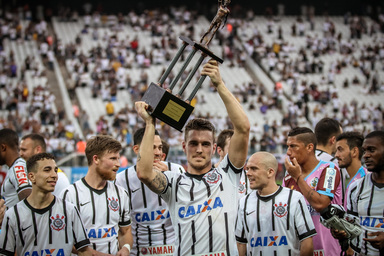
Arena Corinthians, Sao Paulo
Saturday 24th January 2015
Attendance: 26,000
Report by ESPN
Saturday afternoon saw a typically lively afternoon of action in the Ryman Isthmian League South. In perhaps the pick of the action, Ramsgate drew 3-3 at home with Three Bridges in front of 159 fans, while a bumper crowd of 459 turned out to see leaders Burgess Hill Town beat Sittingbourne.
For the team currently in 18th spot in the division, however, it was a rather unusual weekend. Instead of taking on Hastings United on a chilly January afternoon back home, amateur club Corinthian-Casuals were in Sao Paulo, playing Brazilian giants Corinthians in a friendly in front of 26,000 at the Itaquerao World Cup stadium.
Needless to say, the match, which was organised to honour the historical link between the teams and ended in a 3-0 win for the Sao Paulo side of the Corinthians family, was not one that anyone connected with either club will forget in a hurry. But then Corinthians-Casuals are no ordinary non-league club, and the relationship between the team and the Brazilian side -- whose foundation was inspired by their forefathers, legendary English amateur outfit Corinthian FC -- is no ordinary one.
In 1910, Corinthian FC were created to be "an elite standard bearer for the amateur game," as David Goldblatt puts it in his epic on football history "The Ball Is Round." At a time when the strength of the professional clubs in England was growing, they set off on a tour of Brazil after an invitation from Charles Miller, the man widely regarded as the founding father of Brazilian football.
The visitors finished the tour unbeaten, defeating, among others, a Brazilian select side and Miller's Sao Paulo Athletic Club. More important than mere results, however, was the passion for the game that the team's play inspired in five Sao Paulo railway workers. Not long afterwards, so the story goes, Anselmo Correa, Antonio Pereira, Carlos Silva, Joaquim Ambrosio and Raphael Perrone met under a gas lamp in the neighbourhood of Bom Retiro and decided to form S.C. Corinthians Paulista.
It is a considerable legacy: Corinthians have risen to become one of South America's biggest clubs, boasting 30 million fans across Brazil. Twice Club World Cup winners, the club's history is as long and storied as any in the world, with famous players including Rivellino and Socrates.
Much of that history was on display on Saturday afternoon. The players took the field wearing headbands emblazoned with words such as "fraternity," "equality" and "no to war" in a tribute to the Democracia Corinthiana player power movement led by Socrates, and a trophy named after the player was awarded to the Casuals by Rivellino after the game.
Earlier, there had been a welcome email for the visitors from Socrates' widow, Katia Bagnarelli Vieira de Oliveira. "I hope all the players and officials feel that we are giving you a big hug, and that through this hug you feel the presence of Socrates in your hearts, and the feet and minds of the players on the field," it read.
She needn't have worried. From the moment they were mobbed by dozens of Corinthians fans at the airport minutes after landing, to the demands for autographs and photos in restaurants or on the streets, one thing the Casuals were not lacking in Sao Paulo was a warm welcome.
And the feeling went both ways. "We expected the highlight to be the match, and in a way it was," Chris Watney, who doubles as player and press officer for the Casuals, told ESPN FC. "But we also had a chance to touch lives in a way we didn't expect. We visited a cancer hospital, and found out that one of our shirts, signed by players from the team and from Corinthians, had been auctioned off and had helped to save a child's life."
The unique affection that Corinthians fans hold for the English amateurs can also be seen on the Casuals' Twitter feed. "Come back more and more and more time," writes Jordana Gomes; while Charles Xavier says "I hope to meet you guys in England some day! Brothers in football." They are just two of dozens of messages of support for the visitors.
"One of the best feelings in life is to know where you came from, and to be able to honour and celebrate that is a privilege," Leo Carvalho, a Corinthians fan from Sao Paulo who now lives in Long Island, told ESPN FC in an attempt to explain the connection. "This passion that we feel towards our Corinthians simply wouldn't exist if Corinthian FC hadn't come to Brazil. We are forever grateful to the original Time do Povo ("the team of the people," as Corinthians are known), a team who never wanted to turn professional, that lives on purely for the love of the game. We are brothers in football."
Mauricio Savarese, a Brazilian journalist and Corinthians supporter, has another interpretation.
"The original Corinthians players were wealthy and played football for fun, refusing to become professional," he said. "That is something that intrigues Corinthians fans. For Corintianos, to be working class and come from the masses is 90 percent of our identity. To have such a different founding father sparks our admiration and curiosity."
What is certain is that Brazil is a country that cherishes the legends of its footballing past; Corinthians, in particular, is a club that enjoys revelling in its history. Fans love to reminisce about the skills and goals of Rivellino, or Socrates' intoxicating mix of politics and languid midfield grace, while stories are told and retold about the Invasao Corintiana ("the Corinthian Invasion"), when an estimated 70,000 fans travelled from Sao Paulo to the Maracana in Rio de Janeiro for a league title playoff against Fluminense, or the goal by Basilio that won the 1977 Campeonato Paulista and ended a trophy-less drought of almost 23 years.
The respect in which Corinthians fans hold their English "brothers" is no doubt part of that culture -- as is the fact that, amid the seething rivalries of Brazilian club football, having a forefather as steeped in history as the original Corinthian FC is something no other Brazilian team can claim. Every football fan believes their team to be special, and the connection with Corinthian FC allows Brazilian Corinthians fans to feel that their team is just a little bit more special than the rest.
Amid all the reminiscing, it is easy to forget the game itself. Surrounded by a festive atmosphere, the English amateurs mounted a stout rear-guard action for 78 minutes, before Danilo opened the scoring for the home team. Corinthians went on to add two more goals near the end, both scored by Luciano.
"We showed that an amateur team can hold their own against the professionals. We were playing at a far higher level than we're used to, so it was a great effort," Watney said after the game.
But perhaps the most emblematic moment in the match was not a goal or a save or a tackle. It came two minutes from the end when the referee stopped play to allow Danilo and Casuals' striker Jamie Byatt to swap shirts -- and teams -- in an echo of the 1988 meeting between the clubs, also in Sao Paulo, when the great Socrates played for the Casuals for 15 minutes.
"When Danilo and Jamie Byatt swapped shirts at the end and sealed the bond between the two teams, well, I can't explain it, but my eyes felt a bit moist," Leo Carvalho admitted. It is unlikely he was the only fan of either the English or the Brazilian Corinthians, whether sitting in the stands of the Itaquerao or watching at home on TV, who was feeling emotional.












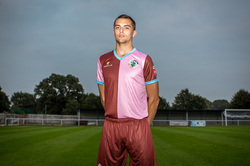
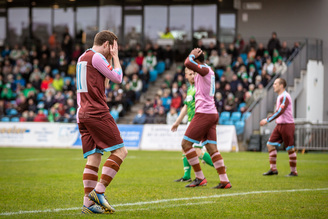
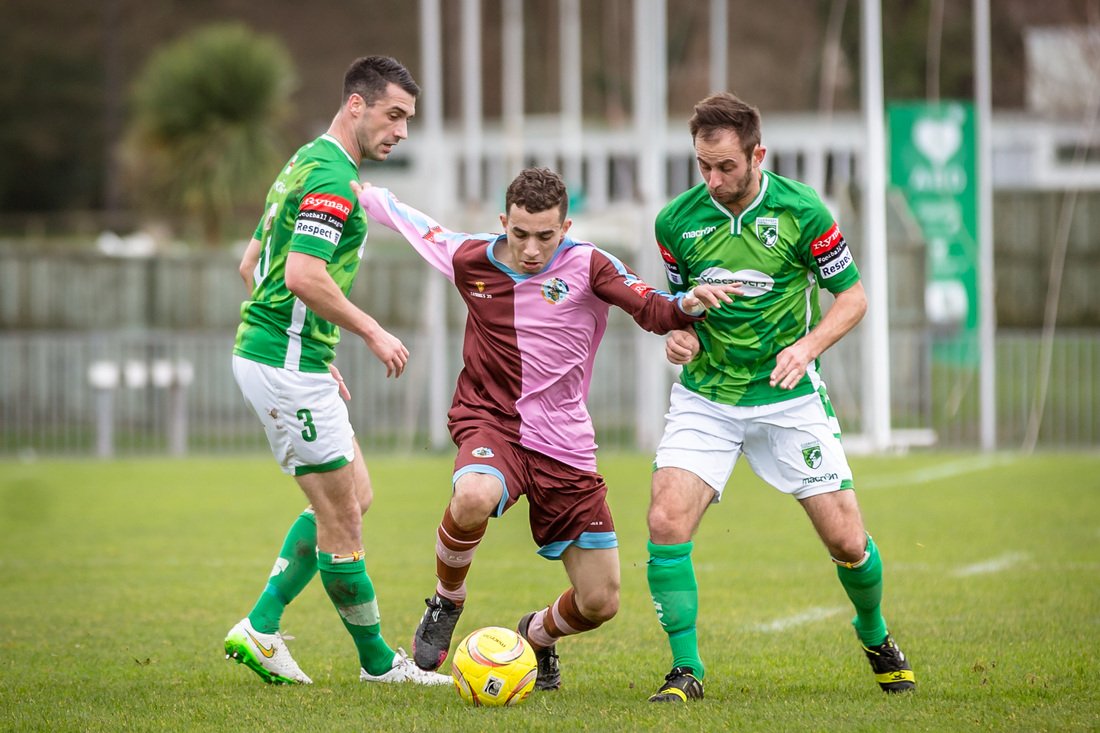
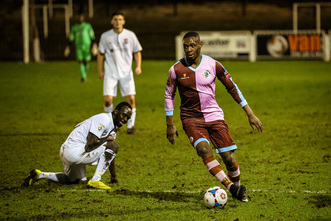
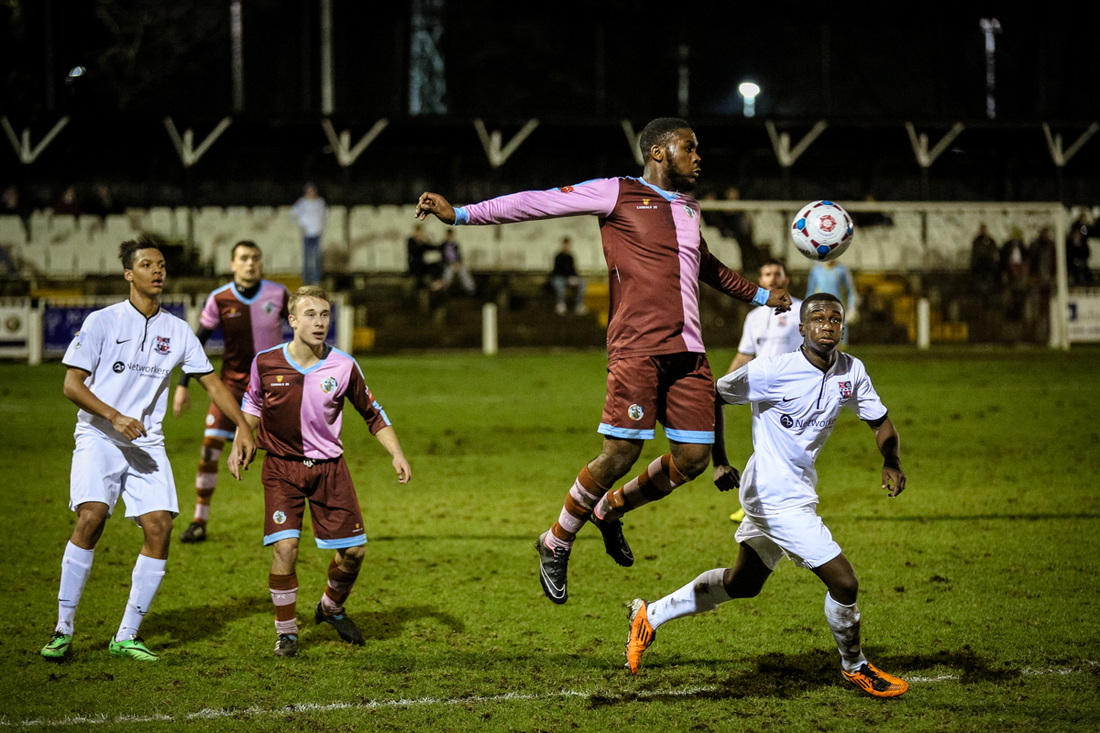
 RSS Feed
RSS Feed